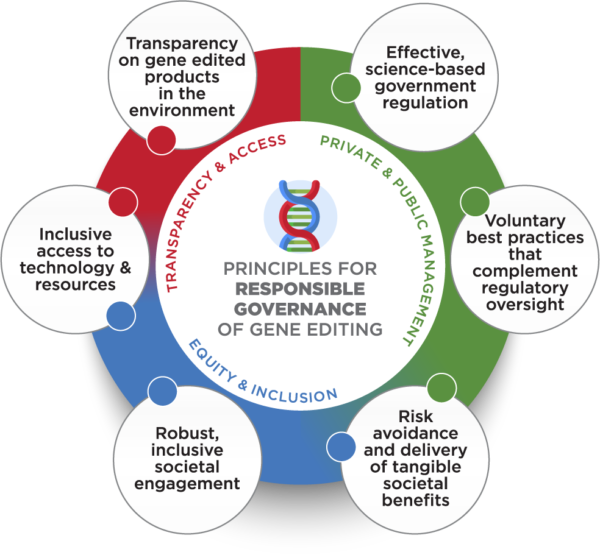
Coalition of NGOs Outline Principles for Responsible Governance of Gene Editing
August 25, 2021| |
A coalition of conservation and consumer non-governmental organizations presented six principles for responsible governance in gene editing in agriculture and the environment in an article published in Nature Biotechnology.
According to the authors, gene editing, as well as other biotechnologies, have the potential to address urgent concerns on food security, environment, human health. However, conflicts and risks also arise. The coalition, which includes the Center for Science in the Public Interest, Consumer Federation of America, Environmental Defense Fund, Wildlife Federation, The Nature Conservancy, and World Wildlife Fund U.S., provided the principles as a high-level framework for responsible innovation and governance of gene-editing technologies.
The six principles presented were:
- Effective, science-based government regulation;
- Voluntary best practices that complement regulatory oversight;
- Risk avoidance and delivery of tangible societal benefits;
- Robust, inclusive societal engagement;
- Inclusive access to technology & resources; and
- Transparency on gene editing products in the environment.
"Our principles could apply to products produced with almost any technology...We have focused on genetic editing because: this methodology has potential for safe and beneficial applications; new products are being developed rapidly; regulation and introduction of new products into commerce is controversial; and the lack of appropriate governance could lead to unintended environmental consequences or severely limit its use," the authors wrote.
Read the principles in Nature Biotechnology or the media release in Keystone Policy Center.
| |
You might also like:
- The Regulatory Landscape for Genome-edited Plants is Rapidly Changing, Experts Say
- Argentina's Years of Experience in Gene Editing Regulation
- GLP Releases Global Gene Editing Regulation Tracker and Index
Biotech Updates is a weekly newsletter of ISAAA, a not-for-profit organization. It is distributed for free to over 22,000 subscribers worldwide to inform them about the key developments in biosciences, especially in biotechnology. Your support will help us in our mission to feed the world with knowledge. You can help by donating as little as $10.
-
See more articles:
-
News from Around the World
- The Impact of Gene Technology in Animal Agriculture and Food Production
- Texas A&M Researchers Engineer Good Bacteria to Aid in Combating Disease
- Technology Developers Share Commercialization Experiences with Filipino Scientists
- NTU Researchers Identify How Xanthomonas Bacteria Infect Plants
- India Eases Rules for Import of GM Soya Cake, Benefits Farmers
- European Commission Authorizes 10 GM Crops for Food and Feed
- UK Report Compares EU Approaches on Food Safety Regulation of Novel Foods and GMOs with Other Countries
-
Research Highlights
- Plant Immune Sensors Found to Navigate Against Invading Microbes Inside Plant Cells
-
Plant
- MHLW Japan Close to Commercial Approval of the First Genome-edited Fish
- Coalition of NGOs Outline Principles for Responsible Governance of Gene Editing
- Study Finds CRISPR Could Render Mosquitoes Infertile, Reducing Spread of Diseases
- High-oleic Tobacco Seed Oil for Bio-diesel Produced Using CRISPR-Cas9
-
Read the latest: - Biotech Updates (January 28, 2026)
- Gene Editing Supplement (January 28, 2026)
- Gene Drive Supplement (February 22, 2023)
-
Subscribe to BU: - Share
- Tweet

